Calamity Jane (1953)
[Note: The following review is of a non-Guide for the Film Fanatic title; click here to read more.]
“Looks like Calamity’s been holding out on us, carrying concealed weapons.”
Synopsis:
Sharpshooter Calamity Jane (Doris Day) bets Wild Bill Hickok (Howard Keel) that she can bring famed showgirl Adelaid Adams to the small town of Deadwood, but accidentally recruits Adams’ personal maid Katie (Allyn Ann McLerie) — an aspiring singer — instead. When Katie learns that Jane is secretly in love with Lieutenant Gilmartin (Philip Carey), she helps Jane present herself in a more feminine fashion; meanwhile, both Hickok and Gilmartin fall in love with Katie, causing romantic tension all around.
Genres, Themes, Actors, and Directors:
- Aspiring Stars
- Character Arc
- Doris Day Films
- Howard Keel Films
- Love Triangle
- Musicals
- Singers
- Strong Females
- Westerns
Review:
Like Annie Get Your Gun (1950), Calamity Jane is a popular ’50s-era musical which Peary fails to include in his GFTFF, but lists in his Alternate Oscars — in both cases, nominating the female lead as one of the Best Actresses of the Year. While I don’t believe AGYG is ultimately “must see”, I would argue that Calamity Jane is, simply for its status as a cult favorite. Indeed, the film remains memorable and provocative simply due to its surprisingly strong gay subtext: much like Preston Sturges was able to get away with an astonishing amount of sexual innuendo in his The Miracle of Morgan’s Creek (1944) by playing carefully within the bounds of the Production Code, the screenwriters here present a resolutely heterosexual storyline (Jane is shown right away as being smitten with a man) which nonetheless possesses a definite undercurrent of homosexual playfulness.
For instance, there’s a rather astonishingly bold moment when “Calam” has just arrived in “Chicagee”, and is wandering ogle-eyed down the street in her buckskins and a cap; suddenly a beautiful lady looks at her and winks — deliberately and flirtatiously. Calam, naturally, is simply befuddled — but what did that woman mean, precisely? Did she really believe Calam was a man? Meanwhile, when Calamity first sets eyes on McLerie, she calls out, “Goshamighty, you’re the prettiest thing I ever seen!” (And once again, McLerie mistakes her for a man.) Later, Day and McLerie set up house together… And so it goes.
Subtext aside, Day’s character remains refreshingly atypical simply for her unapologetically straightforward, no-b.s. approach to life — as indicated so clearly in the following verbal exchange:
Hickok (looking at a photo of Adelaid Adams): She’s charming, lovely figure… Everything that a woman oughta be!
Jane: Looks like a fat, frilled up, side of undressed beef to me!
Although Jane eventually buys into more traditional feminine ideals of beauty (simply to catch her man), she never loses a shred of her spunk or personality.
With that said, I’m actually not sure how I feel about Day’s performance overall; I prefer many of the other fine performances she gave throughout her career — including her portrayal as Ruth Etting in Love Me or Leave Me (1955), and her trio of comedic performances with Rock Hudson. However, for the reasons stated above (as well as a toe-tapping score of songs, and solid supporting performances by both Keel and McLerie), I do believe Calamity Jane is worth a look by all film fanatics.
Redeeming Qualities and Moments:
- Doris Day as Calamity Jane
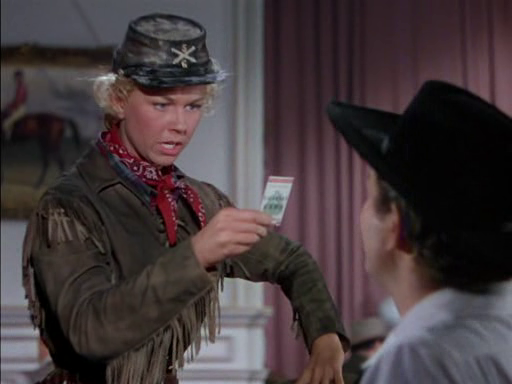
- Allyn Ann McLerie as Katie
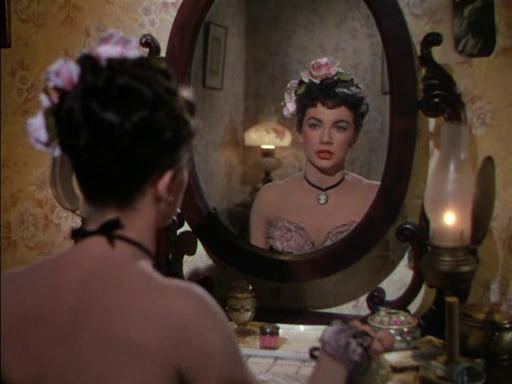
- Howard Keel as Wild Bill Hickock
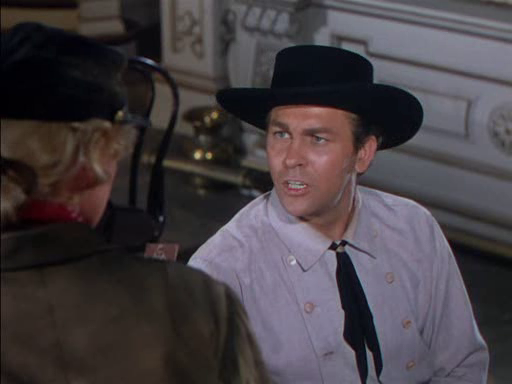
- A fine roster of tunes by Sammy Fain and Paul Francis Webster
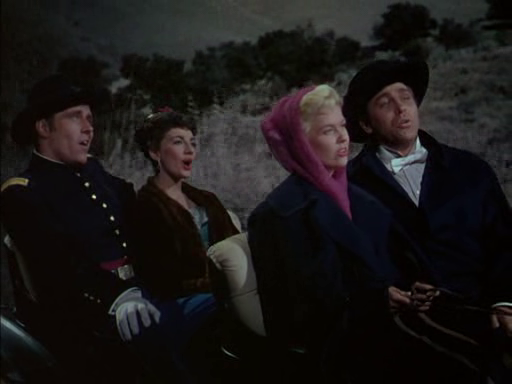
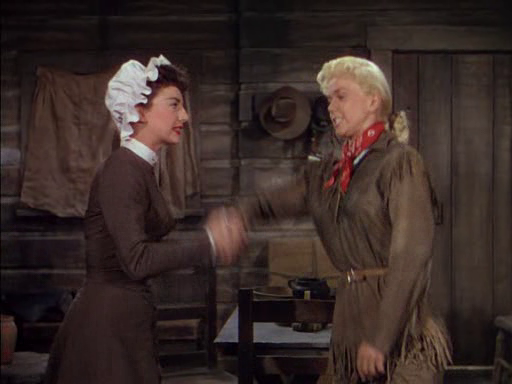
- A fascinating “layer” of gay subtext (if one chooses to “read” it that way)
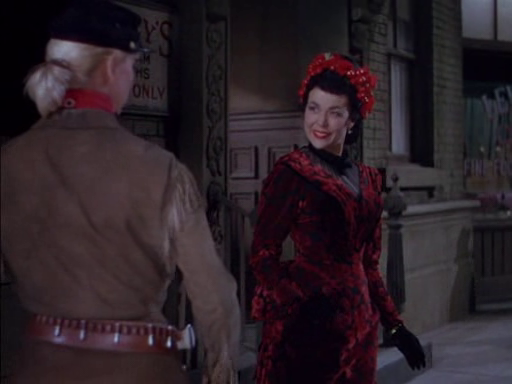
Must See?
Yes, for its cultural relevance as a strongly subtextual, toe-tapping musical.
Categories
- Cult Movie
Links:
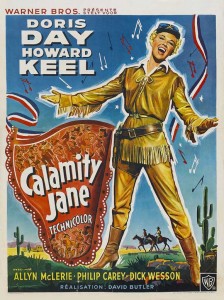
One thought on “Calamity Jane (1953)”
A once-must as a charming/entertaining & thoroughly satisfying musical western – one you won’t mind going back to at some point.
Director David Butler proves handy with a light but sure touch with this kind of material, getting bright, energetic performances out of a fine cast. This is the kind of movie that pretty much just puts and keeps a smile on your face, while occasionally adding a bit of light…well, not drama exactly but misunderstanding. The plot, based in indirect matchmaking, is quite simple. As for the songs, I probably prefer the peppier ones in the film’s first half. (‘Just Blew In From the Windy City’ is quite cleverly and athletically staged by Jack Donohue.) The songs in the latter half are a little more traditional and sentimental.
But it’s the ultimate ballad ‘Secret Love’ that really cements the gay subtext that has been underneath all along (yes, *if* one chooses to read the film that way). Doris singing ‘Secret Love’ – with that haircut, and with those all-too-meaningful lyrics – does seem here to be singing for gay people everywhere (~keeping in mind, of course that, when the film ‘came out’, gay audience members were much more than hungering for film sequences that could at least be read along their lines). But, for me, the surface reading is more powerful: Jane finally realizes what we in the audience have known almost from the beginning of the film – that she and Bill make a good match.
As a gay man, a revisit of the film doesn’t really put forth a gay reading to me. It’s made very clear in the film that very heterosexual Jane is just (apparently) doomed for having spent too many years being a tomboy. It’s also clear that Jane is *such* a tomboy that it’s easy to take her for a man. Obviously, it’s perfectly fine if gay ffs (or other ffs) want to read ‘Calamity Jane’ as gay underneath. Myself, I just think the result is one of those very happy accidents. I see it purely as a heterosexual western. But, however it’s read, it’s a delight.